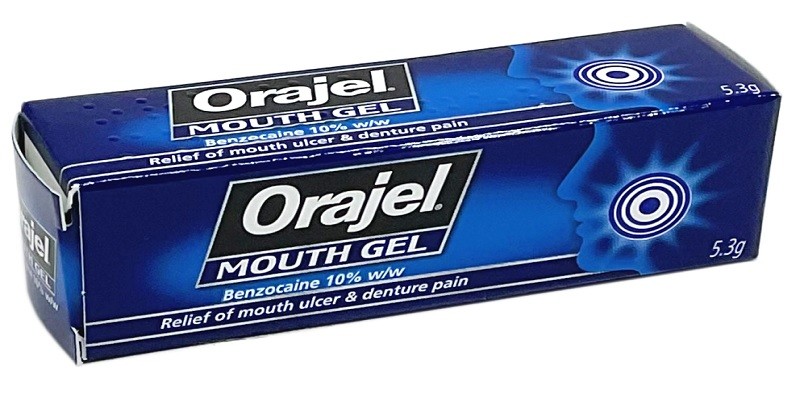Last Updated on January 15, 2025
Pregnant women should consult their healthcare provider before using Orajel. Orajel is a topical oral pain reliever that may not be safe for use during pregnancy due to the ingredients it contains, such as benzocaine.
However, it is important for expectant mothers to seek professional advice to determine the best course of action for their specific needs and medical conditions. Taking precautions and seeking medical guidance can ensure the safety of both the mother and the baby.

Credit: www.themightymouth.org
The Safety Of Orajel During Pregnancy
Exploring the Safety Concerns Surrounding Orajel Use During Pregnancy
During pregnancy, many women experience discomfort, including oral pain and toothaches. Orajel, a popular over-the-counter oral medication, is often used to alleviate these symptoms. However, it is only natural for pregnant women to have concerns about the safety of using Orajel during this crucial time. In this section, we will delve into the safety aspects associated with Orajel usage during pregnancy.
Examining the Active Ingredients in Orajel and Their Potential Effects
To understand the safety of Orajel, it is important to examine its active ingredients and their potential effects on pregnant women. Orajel primarily contains the active ingredient benzocaine, which is a local anesthetic. Benzocaine works by numbing the area where it is applied, providing temporary relief from pain and discomfort. While benzocaine is generally considered safe for topical use, it is recommended to use it sparingly during pregnancy, especially during the first trimester.
Discussing the Risks and Benefits of Using Orajel for Pregnant Women
As with any medication, Orajel carries both risks and benefits for pregnant women. The main concern with using Orajel during pregnancy is the potential absorption of benzocaine into the bloodstream. While limited systemic absorption has been reported, excessive or prolonged use of Orajel during pregnancy should be avoided to minimize any potential risks. It is always best to consult with your healthcare provider before using any medication, including Orajel, during pregnancy.
On the other hand, using Orajel judiciously can provide much-needed relief from oral pain and toothaches, improving the overall well-being of pregnant women. By carefully adhering to the recommended guidelines and not exceeding the suggested dosage, the benefits of Orajel, such as temporary relief from discomfort, can outweigh the potential risks involved.
Addressing Common Misconceptions About Orajel and Pregnancy
There are some common misconceptions surrounding the use of Orajel during pregnancy. One of them is the fear that using Orajel may harm the unborn baby. However, when used as directed and in moderation, Orajel is generally considered safe for pregnant women. It is important to keep in mind that excessive or prolonged use of Orajel may increase the risk of unwanted side effects.
Another misconception is that pregnant women should refrain from any medication during pregnancy. While it is true that some medications carry potential risks for pregnant women, the judicious use of certain over-the-counter medications, including Orajel, can be beneficial. Seeking guidance from healthcare professionals is paramount to ensure the safety of both the mother and the baby.
Understanding the safety of using Orajel during pregnancy is essential for pregnant women in need of relief from oral pain and toothaches. While using Orajel sparingly and within the recommended guidelines can provide temporary relief, it is crucial to consult with healthcare providers to assess any potential risks and benefits associated with its usage. Remember, your healthcare provider is the best source of advice regarding the safety and suitability of specific medications during pregnancy.
Alternative Remedies For Dental Pain During Pregnancy
Dental pain during pregnancy can be an incredibly discomforting experience for expectant mothers. While medications like Orajel may not be recommended for use during pregnancy, there are several alternative remedies that can provide relief from toothaches. Exploring non-medicated options, discussing the use of natural remedies, and highlighting home remedies are some effective ways to alleviate dental discomfort during pregnancy.
Exploring Non-Medicated Options for Relieving Dental Pain During Pregnancy
When it comes to relieving dental pain during pregnancy, non-medicated options can be a safe and effective alternative. While it is always important to consult with your dentist or healthcare provider, here are a few non-medicated remedies that you may consider:
- Warm saltwater rinse: Gently swishing warm saltwater around your mouth can help reduce inflammation and provide temporary relief from toothaches.
- Cold compress: Applying a cold compress to the affected area on the cheek can help numb the pain and reduce swelling.
- Over-the-counter pain relievers: Acetaminophen, when approved by your healthcare provider, can be an option for temporary relief from dental pain. However, it is important to follow the recommended dosage and consult with your healthcare provider before taking any medication.
Discussing the Use of Natural Remedies for Alleviating Toothache
Natural remedies can be a gentle and safe approach to alleviating toothaches during pregnancy. Here are some natural remedies that you may find helpful:
- Clove oil: Clove oil has natural analgesic properties and can help relieve toothaches. Dilute a few drops of clove oil with a carrier oil, such as olive oil, and apply it to the affected area using a cotton ball.
- Peppermint tea: Brewing a cup of peppermint tea and allowing it to cool down can provide a soothing effect when swished around the mouth.
- Tea tree oil: Tea tree oil has antibacterial properties that can help reduce inflammation and fight oral infections. Dilute a few drops of tea tree oil with water and use it as a mouth rinse.
Highlighting Home Remedies to Relieve Dental Discomfort During Pregnancy
Home remedies can offer comfort and relief from dental discomfort during pregnancy. Here are a few home remedies that you can try:
| Home Remedies | Instructions |
|---|---|
| Salt and pepper paste | Mix equal parts of salt and pepper with a few drops of water to make a paste. Apply the paste directly to the affected tooth for temporary relief. |
| Garlic | Crush a clove of garlic and mix it with a pinch of salt. Apply the mixture to the affected area for natural pain relief. |
| Ice chips | Sucking on ice chips can help numb the affected area and alleviate toothache. |
While these alternative remedies may provide temporary relief, it is crucial to consult with your dentist or healthcare provider for a proper diagnosis and appropriate treatment. Taking care of your dental health during pregnancy is essential for both you and your baby’s well-being.
Consulting With Dental Professionals For Pregnant Women
Emphasizing the Importance of Seeking Professional Dental Advice
During pregnancy, maintaining good oral health is crucial not just for the mother but also for the overall well-being of the unborn child. While there are certain dental concerns that pregnant women may experience, it is important for expectant mothers to consult with dental professionals for expert guidance and advice.
Seeking professional dental advice is crucial for pregnant women due to several factors:
- Hormonal changes: Pregnancy hormones can affect a woman’s oral health, leading to various dental issues such as gum disease and sensitivity.
- Increased risk of dental problems: Pregnancy can increase the risk of developing dental problems, including cavities, due to changes in diet, cravings for sugary foods, and morning sickness.
- Possible impact on the baby: Poor oral health during pregnancy has been associated with adverse outcomes for the baby, including preterm birth and low birth weight.
With these factors in mind, it is crucial for pregnant women to consult with dental professionals to ensure the best possible oral health during pregnancy.
Discussing the Role of Dentists in Providing Safe Treatment Options for Pregnant Women
Dentists play a crucial role in providing safe treatment options for pregnant women, taking into consideration the unique needs and concerns of expectant mothers. They are well-equipped with the knowledge and experience to ensure the safety of both the mother and the baby during dental procedures.
Some key aspects of the dentist’s role in providing safe treatment options for pregnant women include:
- Thorough evaluation: Dentists will conduct a thorough evaluation of the woman’s oral health and discuss any concerns or issues she may have. This allows for a personalized treatment plan to be developed.
- Communication with healthcare providers: Dentists may communicate with the woman’s obstetrician or healthcare provider to ensure coordinated care and to address any potential complications or medication interactions.
- Use of safe materials: Dentists will choose materials and medications that are safe for pregnant women, minimizing any potential risks.
- Minimizing exposure to radiation: Dentists will take necessary precautions to minimize radiation exposure during dental procedures, ensuring the safety of both the mother and the developing fetus.
By entrusting their dental care to qualified dental professionals, pregnant women can be confident that they are receiving safe and appropriate treatment options for their oral health needs.
Exploring Dental Procedures that are Safe for Pregnant Women
While certain dental procedures may need to be delayed until after childbirth, there are many treatments that are considered safe for pregnant women. Dental professionals will tailor the treatment plan based on each woman’s unique situation, ensuring both safety and effectiveness.
Some safe dental procedures for pregnant women include:
| Dental Procedures | Safety Considerations |
|---|---|
| Regular dental check-ups and cleanings | Crucial for maintaining oral health and preventing any potential dental issues from worsening. |
| Filling cavities | Prevents the spread of decay and minimizes the risk of complications. |
| Treatment for gum disease | Crucial for preventing gum infections, which may have adverse effects on the baby. |
| Dental X-rays with appropriate shielding | Performed with necessary precautions to minimize radiation exposure. |
It is important for pregnant women to communicate openly with their dentists about their pregnancy and any concerns they may have. By exploring safe dental procedures, expectant mothers can ensure optimal oral health while safeguarding the well-being of their developing baby.
Frequently Asked Questions Of Can Pregnant Women Use Orajel?
Can Pregnant Women Use Orajel For Toothache Relief?
Yes, pregnant women can use Orajel for temporary toothache relief, but it is important to consult their healthcare provider first.
Is Orajel Safe To Use During Pregnancy For Gum Pain?
Orajel can be used for temporary gum pain relief during pregnancy, but it is best to consult with a healthcare professional to be safe.
Can Orajel Be Used By Pregnant Women For Teething Babies?
While Orajel can be used for teething babies, its use by pregnant women should be discussed with a healthcare provider.
Are There Any Risks Associated With Using Orajel During Pregnancy?
Using Orajel during pregnancy is generally safe, as long as it is used as directed and in consultation with a healthcare provider.
Should Pregnant Women Avoid Using Orajel For Cold Sore Treatment?
Pregnant women should consult their healthcare provider before using Orajel for cold sore treatment to ensure safety and discuss any potential risks.
Conclusion
While Orajel may seem like a convenient solution for pregnant women experiencing toothache or gum discomfort, it is important to exercise caution. The active ingredient, benzocaine, has potential risks during pregnancy. It is always advisable to consult with a healthcare professional for personalized advice and alternative options.
Prioritizing oral hygiene and regular dental check-ups is crucial to maintain good oral health throughout pregnancy.

